Top Ten Tuesday is a weekly feature/meme hosted by The Broke and the Bookish. This week’s topic is Top Ten Books with X Setting.
I’d probably better start by defining what I mean by “alternate universe”: a world or universe that is recognizably ours, but contains elements that ours does not. In other words, it might be our world, but with magic or mythological creatures. Or our world, but historical events (large or small) took a different path. Or our world, but scientific laws work differently.
I’m pretty sure I’ve left out some terrific series, but here are some of my favorites through the years. (They are in no particular order.)
Ten Eleven Series Set in an Alternate Universe
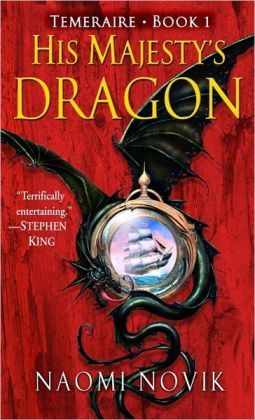 The Temeraire series by Naomi Novik. Tl;dr version: Napoleonic Wars with dragons as the Aerial Corps. This series has some of the best worldbuilding and alternate-history development around, especially if you’re familiar with the history of the Napoleonic Wars. And the relationship between the dragon Temeraire and his human captain, Will Laurens, is a friendship worthy of legend. The books also span the globe; there’s one set largely in China, another in Africa, one in Australia, one in South America, and so on. If you could cross Anne McCaffrey with Patrick O’Brien and add Jane Austen’s wit, you’d end up with something like these books. Reviews: His Majesty’s Dragon ; series review (guest post on Because Reading)
The Temeraire series by Naomi Novik. Tl;dr version: Napoleonic Wars with dragons as the Aerial Corps. This series has some of the best worldbuilding and alternate-history development around, especially if you’re familiar with the history of the Napoleonic Wars. And the relationship between the dragon Temeraire and his human captain, Will Laurens, is a friendship worthy of legend. The books also span the globe; there’s one set largely in China, another in Africa, one in Australia, one in South America, and so on. If you could cross Anne McCaffrey with Patrick O’Brien and add Jane Austen’s wit, you’d end up with something like these books. Reviews: His Majesty’s Dragon ; series review (guest post on Because Reading)
 The Deryni novels by Katherine Kurtz. While not strictly speaking “our world”, the world depicted in the Deryni novels is heavily based on late-medieval/early-renaissance Europe and the Middle East, right down to the maps, the languages, and the cultures, both religious and secular. Throw in the complication of a race capable of ESP/magic, though, and you’ve got a fascinating world which develops somewhat differently than ours. (Note: if you insist on happy endings, you won’t always get them in this series. But if you love late-medieval European and Russian culture, you’ll love these books.)
The Deryni novels by Katherine Kurtz. While not strictly speaking “our world”, the world depicted in the Deryni novels is heavily based on late-medieval/early-renaissance Europe and the Middle East, right down to the maps, the languages, and the cultures, both religious and secular. Throw in the complication of a race capable of ESP/magic, though, and you’ve got a fascinating world which develops somewhat differently than ours. (Note: if you insist on happy endings, you won’t always get them in this series. But if you love late-medieval European and Russian culture, you’ll love these books.)
 The Harry Potter series by J. K. Rowling. A magical world existing side-by-side and interacting with our own, but invisible to non-magical folk. The wizarding world has its own culture and government, and it’s a amazing blend of wonders, terrors, and laugh-out-loud eccentricities. I won’t describe the series further, because you’ve almost certainly read them already—and if you haven’t, you really should.
The Harry Potter series by J. K. Rowling. A magical world existing side-by-side and interacting with our own, but invisible to non-magical folk. The wizarding world has its own culture and government, and it’s a amazing blend of wonders, terrors, and laugh-out-loud eccentricities. I won’t describe the series further, because you’ve almost certainly read them already—and if you haven’t, you really should.
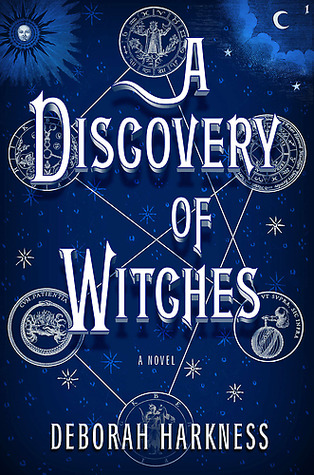 The All Souls trilogy by Deborah Harkness. Witches, vampires, and daemons comprise the three types of “creatures” living secretly alongside humans in Harkness’s richly imagined series. Sometimes described as “Twilight for adults” (a description I dislike), the books feature amazing worldbuilding and meticulous research, as well as terrific storytelling and compelling characters. Reviews: A Discovery of Witches, Shadow of Night, The Book of Life
The All Souls trilogy by Deborah Harkness. Witches, vampires, and daemons comprise the three types of “creatures” living secretly alongside humans in Harkness’s richly imagined series. Sometimes described as “Twilight for adults” (a description I dislike), the books feature amazing worldbuilding and meticulous research, as well as terrific storytelling and compelling characters. Reviews: A Discovery of Witches, Shadow of Night, The Book of Life
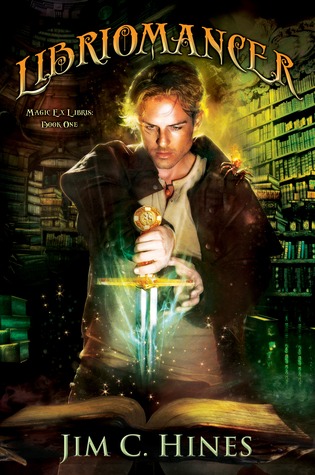 The Magic Ex Libris series by Jim C. Hines. Magical creatures abound in Hines’s Magic Ex Libris series. The twist is their source: libriomancy. Libriomancers can literally reach into a book and pull out anything they want—well, anything that will fit through the pages, and nothing living. But if the libriomancer is bitten by a werewolf or vampire… you do the math. The series is amazing, combining cinematic action scenes and fast-paced adventure with complex characters and moral/ethical questions. The icing on the cake are all the literary and pop-culture references scattered through the books; part of the fun is trying to find and identify them all. Reviews: Libriomancer, Codex Born
The Magic Ex Libris series by Jim C. Hines. Magical creatures abound in Hines’s Magic Ex Libris series. The twist is their source: libriomancy. Libriomancers can literally reach into a book and pull out anything they want—well, anything that will fit through the pages, and nothing living. But if the libriomancer is bitten by a werewolf or vampire… you do the math. The series is amazing, combining cinematic action scenes and fast-paced adventure with complex characters and moral/ethical questions. The icing on the cake are all the literary and pop-culture references scattered through the books; part of the fun is trying to find and identify them all. Reviews: Libriomancer, Codex Born
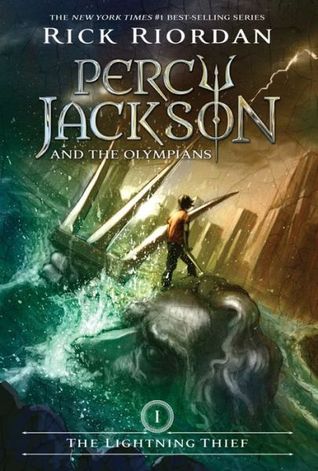 The Percy Jackson and Heroes of Olympus series by Rick Riordan. Imagine if the Greek and Roman gods and monsters were real—and still around. And still creating new demigods, of course, because falling in love (or lust) with human beings was always one of their favorite pastimes. Add in Riordan’s snarky sense of humor and terrific storytelling skills, and you have one of the most popular MG fantasy series around. (If you prefer Norse mythology, Riordan is working on the Magnus Chase series now. And if you prefer Egyptian myths, check out the Kane Chronicles.)
The Percy Jackson and Heroes of Olympus series by Rick Riordan. Imagine if the Greek and Roman gods and monsters were real—and still around. And still creating new demigods, of course, because falling in love (or lust) with human beings was always one of their favorite pastimes. Add in Riordan’s snarky sense of humor and terrific storytelling skills, and you have one of the most popular MG fantasy series around. (If you prefer Norse mythology, Riordan is working on the Magnus Chase series now. And if you prefer Egyptian myths, check out the Kane Chronicles.)
 The Wolves Chronicles by Joan Aiken. When I read and loved these as a child, I didn’t realize that they depict an alternate British history, one in which James II remained on the the throne and Hanoverian supporters keep trying to overthrow the Jacobean monarchy. This MG series is delightful for its somewhat gothic ambiance, occasionally tinged with a quirky and distinctly British sense of humor. The series is best read in publication order, beginning with The Wolves of Willoughby Chase.
The Wolves Chronicles by Joan Aiken. When I read and loved these as a child, I didn’t realize that they depict an alternate British history, one in which James II remained on the the throne and Hanoverian supporters keep trying to overthrow the Jacobean monarchy. This MG series is delightful for its somewhat gothic ambiance, occasionally tinged with a quirky and distinctly British sense of humor. The series is best read in publication order, beginning with The Wolves of Willoughby Chase.
 The Iron Druid Chronicles by Kevin Hearne. Think Percy Jackson for adults. Hearne’s main character is a 2100-year-old druid named Atticus, who has to deal with gods and monsters and supernatural creatures out of just about every mythology that ever existed. Like Percy, Atticus excels at getting himself into trouble, but not always out of it. My favorite character is his dog, Oberon, whose dialogue will leave you laughing out loud. One caveat, though: if irreverence bothers you, these books probably aren’t for you. Review
The Iron Druid Chronicles by Kevin Hearne. Think Percy Jackson for adults. Hearne’s main character is a 2100-year-old druid named Atticus, who has to deal with gods and monsters and supernatural creatures out of just about every mythology that ever existed. Like Percy, Atticus excels at getting himself into trouble, but not always out of it. My favorite character is his dog, Oberon, whose dialogue will leave you laughing out loud. One caveat, though: if irreverence bothers you, these books probably aren’t for you. Review
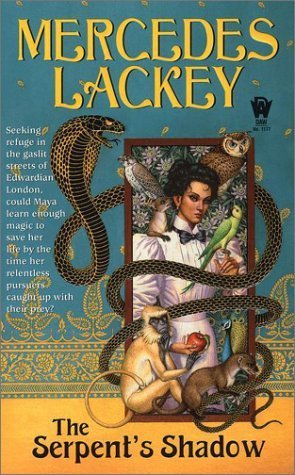 The Elemental Masters series by Mercedes Lackey. Most of these books featuring elemental magic and fairytale retellings are set in Britain during the late 19th and early 20th centuries, although the unofficial first book (The Fire Rose, a Beauty and the Beast retelling) is set in 1905/06 San Francisco, and some of the more recent books take place in Europe. The quality of the writing varies from book to book, but the alternate-magical-Earth premise is well done, and as a whole, the series is fun to read even if some parts of it falter. Reviews: The Serpent’s Shadow, The Gates of Sleep, Phoenix and Ashes, Home from the Sea, Steadfast, Blood Red, From a High Tower, A Study in Sable; Elemental Magic (anthology)
The Elemental Masters series by Mercedes Lackey. Most of these books featuring elemental magic and fairytale retellings are set in Britain during the late 19th and early 20th centuries, although the unofficial first book (The Fire Rose, a Beauty and the Beast retelling) is set in 1905/06 San Francisco, and some of the more recent books take place in Europe. The quality of the writing varies from book to book, but the alternate-magical-Earth premise is well done, and as a whole, the series is fun to read even if some parts of it falter. Reviews: The Serpent’s Shadow, The Gates of Sleep, Phoenix and Ashes, Home from the Sea, Steadfast, Blood Red, From a High Tower, A Study in Sable; Elemental Magic (anthology)
 The Lord Darcy series by Randall Garrett (continued by Michael Kurland.) Magic replaces science in this series inspired by and often based upon classics of the mystery genre. Lord Darcy is a cross between Lord Peter Wimsey, Sherlock Holmes, and Roderick Alleyn; his sidekick, Master Sean O Lochlainn, is a forensic magician. The two solve crimes in a world in which Richard the Lionhearted did not die as a result of his wounds; the Plantagenet Empire is still going strong in the 1960s, when the stories are set. (Due to the emphasis on magic over science, technology is limited, and the books feel more 19th- than 20th-century.) Half the fun is figuring out which classic mystery author or story is being rewritten—and I do mean rewritten, because the solution is almost never the same as in the original mystery.
The Lord Darcy series by Randall Garrett (continued by Michael Kurland.) Magic replaces science in this series inspired by and often based upon classics of the mystery genre. Lord Darcy is a cross between Lord Peter Wimsey, Sherlock Holmes, and Roderick Alleyn; his sidekick, Master Sean O Lochlainn, is a forensic magician. The two solve crimes in a world in which Richard the Lionhearted did not die as a result of his wounds; the Plantagenet Empire is still going strong in the 1960s, when the stories are set. (Due to the emphasis on magic over science, technology is limited, and the books feel more 19th- than 20th-century.) Half the fun is figuring out which classic mystery author or story is being rewritten—and I do mean rewritten, because the solution is almost never the same as in the original mystery.
 The Finishing School series by Gail Carriger. A YA series set in the same gaslamp/steampunk world as Carriger’s Parasol Protectorate series (for adults.) An irresistible combination of mechanical steampunk elements, paranormal creatures (vampires and werewolves), humor, politics, and high adventure, set in a school where young women are taught the skills of etiquette, espionage, and assassination. If you haven’t read them, I highly recommend them! Reviews: Etiquette & Espionage, Curtsies and Conspiracies
The Finishing School series by Gail Carriger. A YA series set in the same gaslamp/steampunk world as Carriger’s Parasol Protectorate series (for adults.) An irresistible combination of mechanical steampunk elements, paranormal creatures (vampires and werewolves), humor, politics, and high adventure, set in a school where young women are taught the skills of etiquette, espionage, and assassination. If you haven’t read them, I highly recommend them! Reviews: Etiquette & Espionage, Curtsies and Conspiracies









































Katherine @ I Wish I Lived in a Library
I’ve only read Harry Potter but a lot of these are on my list – especially Percy Jackson and The Finishing School series. And seriously – how have I not read the Lord Darcy series? Definitely adding that one to my list!
Katherine @ I Wish I Lived in a Library recently posted…Top Ten Tuesday – Ten Books Set on the Beach
Lark_Bookwyrm
The original author of the Lord Darcy books (Randall Garrett) died after only three books. Michael Kurland continued the series for two books, but after that, the series died too. Nonetheless, it has continued to gain fans in reprints, so Baen keeps re-releasing the original three Garrett books in a single volume.
Anne@Headfullofbooks
I’d better get reading because I am only familiar with the Harry Potter series and the Etiquette and Espionage books. Wonderful list.
Lark_Bookwyrm
Glad you like it, and I hope you find some new series to love!
Lark
I love the Deryni books! And, of course, Harry Potter, too. Great list of alternate worlds! 🙂 I’d visit any one of them.
Lark recently posted…Bookish fun and games…
Lark_Bookwyrm
The Deryni books were among the first “adult” fantasy I discovered, other than Tolkien (which I read while still in elementary and middle school.) I still love them… though I admit I’m less fond of the Heirs of St. Camber trilogy, which I found depressing. And I still need to read the Childe Morgan books.
Lory @ Emerald City Book Review
The Lord Darcy books sound like a blast. I’ve never heard of those, so thanks for the recommendation.
Lory @ Emerald City Book Review recently posted…New Release Review: Carry On
Lark_Bookwyrm
They are a lot of fun; I hope you get a chance to read them.
Charlie @ Girl of 1000 Wonders
I’ve only read the HP series from your list. I do enjoy a good alternative universe and time travel. I’ll have to check these out!
Lark_Bookwyrm
I hope you find some you enjoy!
Lindsay
I’m planning to start the Temeraire series soon, after reading and LOVING “Uprooted” a couple months ago! I haven’t ever heard of the Lord Darcy books, but your description makes them sound like a wonderful mix of amazingness!
The All Souls trilogy is one of my favorites, but I’ve never heard the Twilight comparison before. I can see why, on the surface, someone would say that, but I really don’t think they’re anything alike. (And I actually do like Twilight!)
Lindsay recently posted…13 Books With Refreshingly Underused U.S. Settings
Lark_Bookwyrm
The Lord Darcy mysteries are fun. The Temeraire books are AWESOME. 🙂
Agnes @ Haphazard Bookshelves
So many of these are new to me! Thank you for all the additions to my TBR. I plan to start Temeraire soon.
Lark_Bookwyrm
Oh, I hope you love Temeraire as much as I do!
Rita @ View From My Books
I’ve read part of the Harry Potter series and book one and half of two of the Discovery of Witches series (loved book one, not as happy with two).
Now you have me interested in Lord Darcy. Sounds like something right up my alley as I am currently reading all HF 🙂 Thanks!
Rita @ View From My Books recently posted…My Sunday Update- 8/14/16
Lark_Bookwyrm
Rita, I think you would love the Lord Darcy books! They’re not exactly historical fiction, but they do have something of that feel, plus the fantasy element of magic. And for someone who’s familiar with the classics of the mystery genre (by reputation at least), they’re doubly fun. I do hope you read them!
Grace @ Mint Novels
HARRY POTTER. WOOT WOOT. Isn’t it funny how PJO and HP are such similar books? Chosen boy, alternate world he had no idea about, two new best friends, one male and one female… sometimes I suspect Rick Riordan of plaguarizing just a little. 😀 But I love ‘im anyways.
MY TTT
Lark_Bookwyrm
Check out my post on Original Ideas — I didn’t use that example, but I talked about plot similarities and why they’re inevitable. This actually would have been a good example; I wish I’d remembered it when I was writing the post!
Heather @ Random Redheaded Ramblings
I quite fancy trying the Temeraire books, I loved Uprooted by this author and would like to read some more of her books.
Heather @ Random Redheaded Ramblings recently posted…REVIEW – Poison City by Paul Crilley
Lark_Bookwyrm
The Temeraire books are amazing! They have a very different feel, though; Novick did a terrific job of adopting and adapting the Regency-era literary style to a fantasy novel. The dialogue in particular reads more like something from Austen or Patrick O’Brian than something written today. (I know O’Brian wrote in the 20th century, not the 19th, but he too was good at conveying it in his dialogue.) For me, that’s a plus; the Temeraire books are alternate-history fantasy, and should reflect that historical period. Which they do, extremely well. Also, if you like audio books, Simon Vance does an excellent job narrating these.